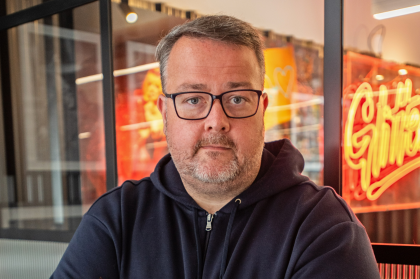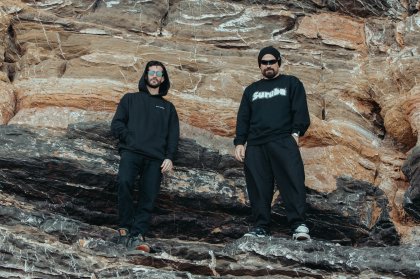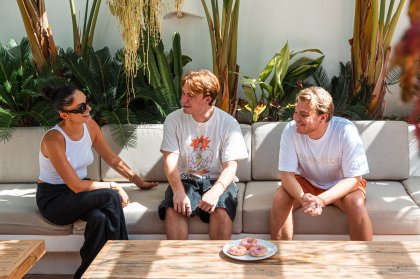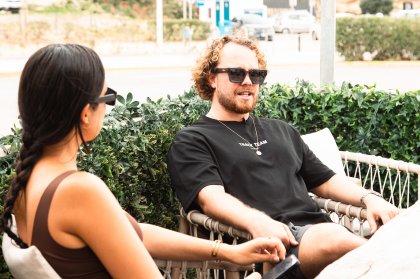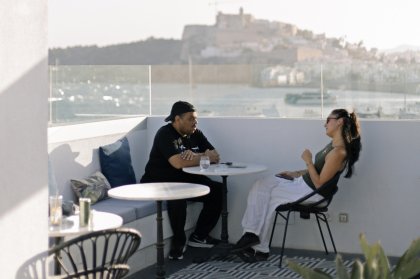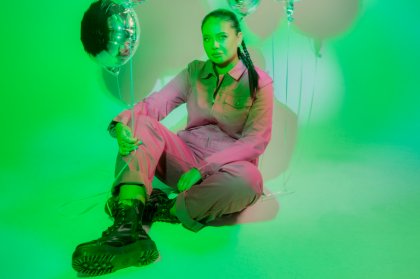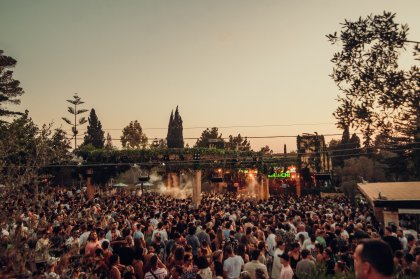
Even amateur sound scribes encounter an overwhelming amount of music each and every week, but hearing an album that's both truly original and impossible to forget isn't an everyday pleasure. In fact, it actually happens very rarely indeed.
Imagine our joy then when The Eyes In The Heat's inaugural long player dropped on our sand-soaked welcome mat. Released via cult Gallic electronic imprint Kill The DJ, the contents are at once born of futurism and gritty guitar tones, kind of like synth pop meeting post punk and new wave. Their sound also manages to meld an organic approach to songwriting with stark, programmed machines. Tracks grow from humble beginnings, lyrics discuss human emotions, whilst pre-set arrangements hit every beat with uncompromising accuracy.
Once you realise the outfit is led by female singer-songwriter Zizi Kanaan and UK techno stalwart Oliver Ho (known to some of our readers as Raudive), then this marriage of natural and man made elements makes perfect sense. Straddling genres and eras in a truly experimental way befitting the best indie-dance hybrids, thankfully the LP, Program Me, stops short of ever becoming obtuse or abrasive. Putting it simply, they push boundaries without testing the patience of listeners, and with this in mind we gave the two key players a call at their respective London bases, to discuss what makes them tick.
Your debut album just arrived, how have things been going with the release?
OH: "Yeah good, it's gone down really well in France. The label, Kill The DJ, has a really good following there, and it has kind of placed us into a context that really makes sense in terms of the sounds we're experimenting with."
As a two-piece you began working together in 2010- is that right?
ZK: "Yeah, that sounds about right."
OH: "Maybe 2009-2010 yeah, that's when we started to work on a few ideas, maybe proto-tracks if you will. It was very different stuff from what we're doing now, much more basic, Heavenly Blues influenced even. From there it slowly started to progress as we refined the sound."
So was it a chance occurrence that brought you both together?
OH: "Well, we met around the time we began working together."
ZK: (Laughing) "Yeah. I wouldn't exactly say a coincidence but it was kind of fated."
Fair enough. Oliver, we associate you with techno. Was this kind of project something you had in mind for a while beforehand?
OH: "Well over the last five years or so I've been joining the dots and finding the parallels between music that I like. Techno, post punk, industrial… I guess just realising that the music I'm into doesn't have to be divided into separate boxes. I wanted to embrace music more as a whole, rather than concentrating on genres."

The evidence is mounting that genres are becoming pretty irrelevant. What's your take on things?
OH: "Well you have a whole new generation now, who have taken influences from house, garage, techno. A lot of the new bass stuff sounds really fresh, and that comes from people not lingering in the shadows and adhering to expectations of genre."
ZK: "A lot of it has to do with technology, and being able to really mix things up with electronics. You don't have to be a violinist to add orchestral elements. It's much easier to do that kind of thing now, and truly cross the borders."
OH: "Yeah, it's kind of like the evolution of all music. Rock music, for example, started out as just one thing really. Now look at it, with so many variations, including all the bands that are now mixing in electronic music too."
ZK: "I think music has just become so saturated, and there are just so many bands out there, that this situation was inevitable. In order to try new things and be a little different people will look to blend different styles in an attempt to open up new avenues I guess."
Does that saturation in the marketplace worry you at all?
ZK: "It is what it is really. In places like London or New York all those industries are just completely saturated. I think what's interesting is the old law of the critics rule."
"They used to be so important in order to show some objective context. That is being lost, and it's a big shame. You know, so people don't all start drooling over some band that's actually pretty damn boring."
OH: "I think that's where cultural filters have a huge part to play. So where the critics used to be there are now particular tastemaker websites that pick out what they want to recommend. On the whole though more music isn't a good thing, and it means you have to focus harder to find the stuff you like."
In terms of music you both like, what influences should we listen for on the LP?
OH: "It's a difficult one to summarise really, but there's a definite style there, a kind of economy of sound or minimalism, which we both love. Also a mixture of discordance balanced with humanism. Like machines and humans. In some ways I also think there's a bluesy edge to it too. The attitude is what's consistent I think- Zizi?"
ZK: "Oh yeah, I totally agree!"
OH: "I'm influenced by new wave, industrial, lots of things like that, but then also people like John Lee Hooker. Then Zizi listens to a lot more folk, and I think you can really hear all that stuff in there."
ZK: "We're trying to play around with structures a little, and how a song can be presented, if that makes sense."
So how does that transfer onto stage then?
OH: "We're in a great place right now actually, well I think so anyway, we're a three piece now."
ZK: "Yeah, the live show isn't really the same, it's quite tribal in many ways."
OH: Yeah, we're quite a different band live compared with on record. We're not concerned with trying to replicate what's on the album exactly, we think the live experience should be something else, something unique really.
Our drummer, Jerome, brings a real element of spontaneity to it all. And so it's created a kind of balance, between live improvisation and metronomic, sythesized sequences. It's really interesting to play with those things together.
ZK: It's fascinating to construct this live show too. We're looking at the unity of it all, song progression, and the order are very important. A little bit like constructing the album I suppose. You can put the tracks in different combinations and the effect is wildly different every time, even so far as how the individual song sounds.
Finally then, where from here for The Eyes In The Heat?
OH: Well, we've constantly got a backlog of material, and we're working on some new stuff too, tracks and also some short films. We would ideally like to create a body of work that goes well beyond just music, encompassing other media at the same time.
What kind of films would they be?
ZK: Well, I reworked this speech, it's called Counterfactual Number One. It's an unused speech that was written in case the moon landings failed. An event that changed history, but could have gone wrong, and how we might see ourselves now if it had.
Just skewing certain events in history and seeing what might have happened, that's interesting. I don't want to say too much more as it's all things that we're still working on at the moment, but there are quite a few ideas.
